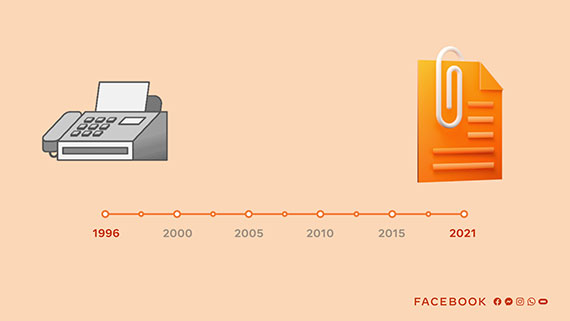The Hill’s Morning Report – Presented by Facebook – Democrats’ agenda in limbo as Senate returns

Presented by Facebook
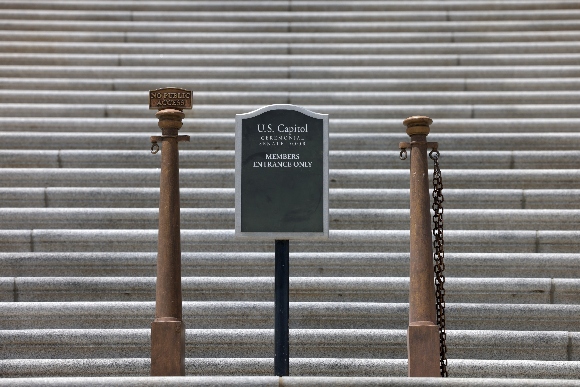
Welcome to The Hill’s Morning Report. It is Tuesday! We get you up to speed on the most important developments in politics and policy, plus trends to watch. Alexis Simendinger and Al Weaver are the co-creators. Readers can find us on Twitter @asimendinger and @alweaver22. Please recommend the Morning Report to friends and let us know what you think. CLICK HERE to subscribe!
Total U.S. coronavirus deaths reported each morning this week: Monday, 597,628; Tuesday, 597,952.
Country roads are guiding the Senate, as the two West Virginia senators, Shelley Moore Capito (R) and Joe Manchin (D), hold the keys to the future of a bipartisan infrastructure measure and the Democratic agenda.
Capito, the lead GOP negotiator on an infrastructure package, is expected to speak once again with President Biden today. However, she indicated on Monday that the two sides could be moving down a road that’s heading nowhere, telling reporters that despite a new offer from the White House last week worth $1 trillion, the two sides remain miles apart, with precious few signs that the chasm between the two offers can be gapped.
“I don’t know where we’re going from here,” Capito said. “We made a good, robust effort. The biggest infrastructure package ever, pay-fors that we delineated. And he said, ‘That’s not enough.’ So I accept that. I mean, I have to. He’s the president” (NBC News).
The West Virginia Republican added that the GOP’s offer was “still not enough” and that the White House is “looking at other ideas.”
“So that sounds pretty definitive to me,” she added.
The comments come amid an important stretch for the two sides, especially with Biden set to depart on his first foreign trip on Wednesday, meaning that any progress will need to be made by then. The White House on Monday said that it still sees a path forward for a bipartisan deal.
“The time is not unlimited here … nor is the president’s willingness to compromise,” White House press secretary Jen Psaki said at a briefing. “He made clear that the proposal the offer put on the table didn’t meet his own bar. But we’re very open to where the discussion goes from here.”
As The Hill’s Brett Samuels points out, Psaki signaled multiple potential paths for a possible bill, although none of them are clear at the moment, especially if a bipartisan bill is the goal. Among the key hang-ups in talks with Capito remains the amount of new money included, with Biden calling for at least $1 trillion, compared with $300 billion in the GOP’s latest offer, which was nearly $1 trillion overall.
Adding to the infrastructure dynamics, a bipartisan working group outside of the Biden-Capito negotiations is preparing a blueprint of their own. The group of roughly six senators, including Sens. Mitt Romney (R-Utah), Rob Portman (R-Ohio), Kyrsten Sinema (D-Ariz.) and Manchin are expected to shop their $880 billion proposal to a broader group of roughly 20 centrist-minded senators, known as the G-20, this week.
“We’ve pretty much agreed on the spending level. I’m sure there will be some adjustments as we go along, and the pay-fors. …We have a proposal that we’ll take to the entire group and see how they feel about it,” Romney said. “Maybe they’ll just throw it out altogether” (The Hill).
The Associated Press: “A lot of anxiety” for Democrats as Biden agenda stalls.
Across the aisle, Manchin has become the focus of attention on the Democratic side after announcing his opposition to legislation that would overhaul the election system and voting rights, reiterating for the umpteenth time that he will protect the legislative filibuster.
However, criticism of the West Virginia senator has reached a crescendo within progressive circles. Rep. Jamaal Bowman (D-N.Y.) responded to Manchin’s opposition to the For the People Act, saying that he is “the new Mitch McConnell.” More importantly, it’s prompted the left to answer multiple questions over how to implement its agenda.
As The Hill’s Hanna Trudo writes, Democrats could go public with their pressure against Manchin and hope for an assist from the White House (though after last week, that might not be a great idea). Alternatively, they could accept reality and tweak their proposals with the goal of winning over the moderate Democrats vote.
Liberals are also wondering if Senate Majority Leader Charles Schumer (D-N.Y.) will get tough with Manchin, as he holds multiple leverage spots over the two-term lawmaker, including the power to yank his chairmanship of the Senate Energy and Natural Resources Committee. As Alexander Bolton notes, Schumer does not have a reputation for getting tough with colleagues, but the Democratic agenda could hinge on whether he can get Manchin in line with the majority.
Niall Stanage: The Memo: Political winds shift against Biden.
Politico: The left hates Manchin. His fellow Senate Dems are staying quiet.
The Washington Post: Democrats grapple with way forward on Biden agenda after Manchin throws up roadblocks.
Jordain Carney, The Hill: Senate filibuster fight throws Democrats’ wish list into limbo.
The Atlantic: Pete Buttigieg, infrastructure salesman.
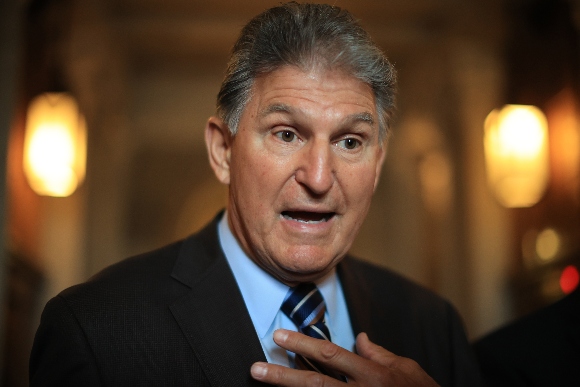
> Jan. 6 fallout: House lawmakers are increasingly pressing party leaders in the Senate to take another stab at establishing an independent commission to examine the violence at the Capitol that day.
Senate Republicans last month had blocked bipartisan legislation to form a 9/11-style panel to investigate the Capitol attack, launching an internal Democratic debate about how best to examine the riot without eroding the public’s trust in the outcome. As The Hill’s Mike Lillis reports, a number of rank-and-file members believe their first choice remains the best and are urging Schumer to bring the commission vote to the floor for a second time.
“I hope Leader Schumer finds the votes and gets the independent commission back up for a vote,” said Rep. Madeleine Dean (D-Pa.). “That is the best path forward.”
The Hill: New report highlights severe intelligence failures on Jan. 6.
NBC News: Senate report cites Capitol Police failure to respond to threats ahead of Jan. 6 riot.
The New York Times: Senate poised to pass huge industrial policy bill to counter China.
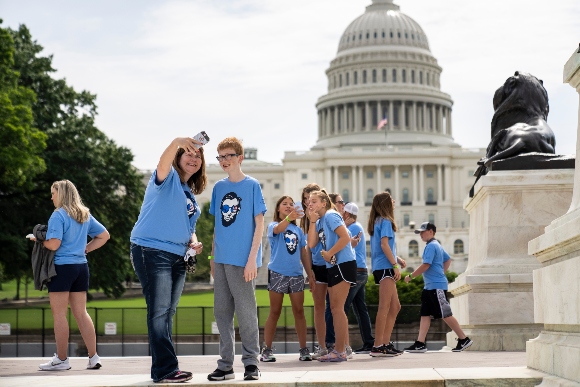
A MESSAGE FROM FACEBOOK
The internet has changed a lot since 1996 — internet regulations should too
It’s been 25 years since comprehensive internet regulations passed. See why we support updated regulations on key issues, including:
– Protecting people’s privacy
– Enabling safe and easy data portability between platforms
– Preventing election interference
– Reforming Section 230
LEADING THE DAY
ADMINISTRATION: Vice President Harris offered a tough-love message on Monday in Guatemala City, emphasizing the U.S. aim to see more economic “hope at home” and less corruption in the impoverished country while telling residents of struggling Central American nations not to make the trek to the U.S. in search of a better life. “Do not come. Do not come,” she said while meeting with Guatemalan President Alejandro Giammattei (pictured below) (The Associated Press).
Harris is making her first international trip as vice president and will be in Mexico today. She has been tasked by the president with tackling the “root causes” of Central American migration and championing a more holistic and less punitive approach to immigration and refugee policies than had been implemented under former President Trump.
Harris also announced a handful of new initiatives, including a joint task force to combat human trafficking and smuggling, a young women’s empowerment program, and a U.S. anti-corruption task force, reported The Hill’s Morgan Chalfant and Rafael Bernal.
Harris said that the United States would invest in agricultural businesses and affordable housing and help support entrepreneurs in Guatemala. The White House said that it plans to invest $48 million over four years to boost economic opportunity in the country. Harris also said the U.S. would send a half-million surplus coronavirus vaccine doses to Guatemala as part of a broader effort to boost the global vaccine supply.
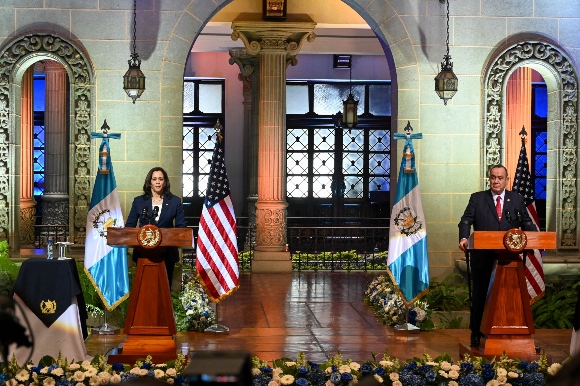
> DOJ ransom recovery: The Justice Department announced on Monday that it recovered the majority of a multimillion-dollar ransom payment to hackers after a cyberattack that caused the operator of the nation’s largest fuel pipeline to halt its operations last month. The government’s operation to recover the cryptocurrency from the Russia-based hacker group is the first undertaken by a specialized ransomware task force created by the department and reflects what U.S. officials say is an increasingly aggressive approach to deal with ransomware threats. Colonial Pipeline officials in May said they took their hacked pipeline system offline and decided to pay a roughly $4.4 million ransom in order to try to restore operations. The 63.7 bitcoin ransom — a favored currency of hackers because of the perception that it is more difficult to trace — is currently valued at $2.3 million (The Associated Press and The Hill).
How did the federal government claw back most of the ransom? NBC News reports the seizure of DarkSide’s bounty took place in Northern California, within the reach of U.S. law, and involved the FBI’s access to hackers’ “private key” or password to a bitcoin wallet.
The Associated Press: Colonial Pipeline CEO Joseph Blount will appear before the Senate Homeland Security Committee today.
At the same time that cryptocurrency is publicly being identified with criminal schemes concocted to try to slip through international traces, cryptocurrency companies are prodding U.S. regulators to develop clear rules — and they want to write those regulations. The industry is concerned about Treasury Secretary Janet Yellen’s crackdown on digital currency that would require crypto transfers to be reported to the IRS. Gary Gensler, chairman of the Securities and Exchange Commission, testified to Congress last month that he would like to see more regulation of crypto exchanges to protect investors (Reuters).
The Washington Post: Separately, the FBI and Australian police created an encrypted communications app loaded into custom cellphones. In a police sting spanning the United States, Australia, New Zealand and Europe, the app became a trap for criminals who began to use it, resulting in arrests and detentions of criminal gang suspects.
> Biden departs Washington on Wednesday for a weeklong trip in Europe that will conclude on June 16 with a summit with Russian President Vladimir Putin in Geneva. Russian-condoned and ordered cyberattacks will be on Biden’s list of face-to-face complaints. Reuters summarizes key topics expected to be on the president’s international itinerary, which is intended to show U.S. support for allies, international institutions and NATO. NPR reports how the Biden administration describes what it wants in dealings with Russia.
> CNN: During a phone conversation on Monday, Biden invited President Volodymyr Zelensky of Ukraine to visit Washington in July and referenced U.S. plans to provide 900,000 COVID-19 vaccine doses to the country.
Politico: Biden’s foreign policy: Reverse the Trump agenda but hit one similar note.
> The White House released a preliminary report this morning drawn from Biden’s ordered review and creation of a task force with a focus on U.S. supply chain disruptions. A 250-page report about semiconductor manufacturing and advanced packaging; large capacity batteries; critical minerals and materials and pharmaceuticals and active pharmaceutical ingredients is HERE.
More administration news: The Biden economic team and the Federal Reserve are each focused on inflation worries while also selling the American public on a vision of confidence about U.S. economic recovery, reports The Hill’s Sylvan Lane. … The Hill’s tax reporter, Naomi Jagoda, analyzes the many questions raised by the weekend agreement among Group of Seven finance ministers to back a global minimum tax of at least 15 percent levied on multinational corporations. One big U.S. hurdle: It faces dim prospects for congressional passage at the moment.
IN FOCUS/SHARP TAKES
POLITICS: It’s a primary election day for Democrats in Virginia who are eyeing a potential successor to Gov. Ralph Northam (D), who completes the state’s four-year term next year. The primary race has been dominated by former Virginia Gov. Terry McAuliffe, 64, who is keen to win a return engagement to the executive mansion in Richmond. Polls throughout the primary have consistently shown the fundraising dynamo and former Democratic National Committee chairman leading a five-person primary field. Governors who win nonsequential new terms are rare in U.S. political history (Jerry Brown in California, Terry Branstad in Iowa and John Kitzhaber in Oregon are examples). Virginia primary opponents are encouraging voters to back new blood, particularly from the progressive wing of the party, The Hill’s Julia Manchester reports.
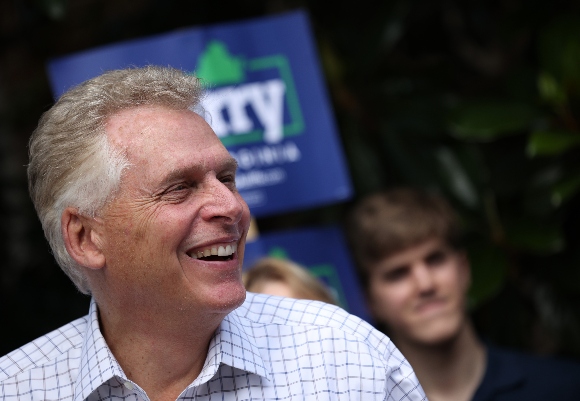
It’s never too early to take the temperature of political politics in the Sunshine State, home of several potential Republican White House wannabes. For Biden and Harris, one of many calculations for reelection would be U.S. policy toward Cuba and the effect on Florida voters. The Hill’s Max Greenwood and Celine Castronuovo point out that Biden has kept in place Trump-era restrictions on Cuba following back-to-back Florida defeats for the Democratic tickets in 2016 and 2020. The shift in turnout for Democratic presidential nominees recorded in those years in Miami-Dade, the state’s largest county, tells part of Florida’s political story.
CNN: Former Trump attorney Rudy Giuliani in 2019 coaxed members of the Ukrainian government to investigate baseless conspiracies about then-candidate Biden, according to new audio obtained by the cable news outlet. CNN reports that the 40-minute audio undermines Trump’s claim that “there was no quid pro quo” involving potential U.S. government support if Ukraine’s president agreed to do political favors to undermine Biden.
*****
CORONAVIRUS: Poor and developing countries are set to press the Group of Seven (G-7) nations this week to ramp up financial donations and donations of COVID-19 vaccine doses in an effort to end the pandemic in the developing world.
Although the G-7 nations have committed millions of vaccine doses, health officials and leaders from developing countries are calling on them to commit more resources for poorer nations, which lag far behind most richer countries in inoculating the masses.
“This is the most important G-7 in history, because this one can dictate how fast we can get out of this pandemic, and whether we save trillions of dollars and millions of lives,” Bruce Aylward, senior adviser to the director-general of the World Health Organization and leader of a partnership of international health groups told The Wall Street Journal.
According to an International Monetary Fund proposal, a donation of 250 million doses to poor countries this summer is needed in order to keep jab programs on track.
Axios: Poll: America says goodbye to the pandemic.
The New York Times: How the “Alpha” coronavirus variant became so powerful.
The Associated Press: Spain opens borders to tourists, cruise ships.
The Morning Report is created by journalists Alexis Simendinger and Al Weaver. We want to hear from you! Email: asimendinger@digital-stage.thehill.com and aweaver@digital-stage.thehill.com. We invite you to share The Hill’s reporting and newsletters, and encourage others to SUBSCRIBE!
OPINION
It is time to designate Pakistan as a terror sponsor, by Akhil Ramesh, opinion contributor, The Hill. https://bit.ly/3uVaJOM
Fossil fuels are definitively the new tobacco, by Andreas Karelas, opinion contributor, The Hill. https://bit.ly/3x6KB58
A MESSAGE FROM FACEBOOK
Why Facebook supports updated internet regulations
2021 is the 25th anniversary of the Telecommunications Act of 1996, the last major update to internet regulation. It’s time for an update to set clear rules for addressing today’s toughest challenges.
See how we’re taking action on key issues and why we support updated internet regulations.
WHERE AND WHEN
The House meets at 10 a.m. for a pro forma session. Lawmakers resume legislative work in the Capitol next week.
The Senate meets at 10 a.m. and will resume consideration of the nomination of Julien Neals to be U.S. district judge for the District of New Jersey.
The president will receive the President’s Daily Brief at 10:15 a.m. Biden has no public events on his schedule.
The vice president is in Mexico today for meetings tied to immigration and economic issues and returns to Washington tonight.
Secretary of State Antony Blinken will testify about his department’s fiscal 2022 budget (and many related international issues) to the Senate Appropriations Committee at 10 a.m. and to the Senate Foreign Relations Committee at 2:15 p.m.
Economic indicator: The Census Bureau reports at 8:30 a.m. on U.S. trade in April, following data from March that showed a record trade deficit.
The White House press briefing is scheduled at 1 p.m., to include White House international economic advisers. The administration’s coronavirus response team will brief journalists at 10:15 a.m.
Hill.TV’s “Rising” program features news and interviews at http://digital-stage.thehill.com/hilltv or on YouTube at 10:30 a.m. ET at Rising on YouTube.
ELSEWHERE
➔ ALZHEIMER’S: The Food and Drug Administration (FDA) on Monday approved Biogen’s aducanumab, the first drug in more than two decades to be approved to combat Alzheimer’s disease. Aducanumab is also the first drug cleared by the FDA to slow cognitive decline caused by the disease, which is the sixth leading cause of death in the United States. Public pressure has been mounting for the drug’s approval since 2016, when it showed promise in slowing cognitive decline (CNBC and The Associated Press). The drug is being approved without really knowing if it works. Clinical trials provided incomplete evidence to demonstrate its effectiveness, so the government granted approval on the condition that the manufacturer, Biogen, conduct a new clinical study (The New York Times).
➔ SUPREME COURT: Justices unanimously ruled on Monday that thousands of people living in this country for humanitarian reasons are ineligible to apply to become permanent residents. Justice Elena Kagan wrote for the court that federal immigration law prohibits people who entered the country illegally and now have temporary protected status from seeking “green cards” to remain in the country permanently (The Associated Press). … The Supreme Court also agreed on Monday to decide whether a lawsuit can go forward in which a group of Muslim residents of California allege the FBI targeted them for surveillance because of their religion. It’s the second case the court has accepted for the fall involving a government claim of “state secrets,” the idea that the government can block the release of information it claims would harm national security if disclosed (The Associated Press). … Also on Monday, justices declined to hear a lawsuit alleging that the United States’s all-male military draft amounts to unconstitutional discrimination on the basis of sex. The administration asked the court to decline to hear the case because Congress is weighing some Military Selective Service Act issues (The Hill).
➔ FIRST IN FLIGHT: The U.S. Navy reported on Monday that a drone refueled a U.S. fighter jet on Friday, marking the first time that an unmanned aircraft transferred jet fuel mid-flight. The Navy posted video of the F/A-18 Super Hornet receiving fuel from a Boeing-made drone. Boeing said that the two flying objects flew during the refueling at 20 feet apart (CBS News).
➔ BILLIONAIRES IN SPACE: Amazon founder Jeff Bezos, 57, will ride his own rocket into space on July 20, joining the first crew to fly in a Blue Origin capsule. He will be joined for the 10-minute up-and-down hop, which produces about three minutes of weightlessness, by his firefighter brother, Mark Bezos, and the highest bidder in a charity auction. Jeff Bezos is retiring as CEO of Amazon 15 days before his space flight. Virgin Galactic’s Richard Branson also plans to launch aboard his own rocket later this year, after one more test flight over New Mexico. SpaceX’s Elon Musk — who’s transported 10 astronauts to the International Space Station and already sold private flights — has yet to commit to a spaceflight (The Associated Press).

THE CLOSER
And finally … Today is World Oceans Day, invented in 1992 by the United Nations with leadership from Canada to remind us of human impacts on the planet’s oceans.
Depending on where Americans live, communities are hosting cleanup events at beaches, swearing off single-use plastics, eating less seafood today, and supporting coral reefs and natural habitats dependent on temperature, fewer toxins and minimalist human disturbances. As we all know, 70 percent of Earth’s surface is covered by water.
People around the world are demonstrating a bit of appreciation for oceans today on screen and in person, through art, science exhibits, books and music.


Copyright 2023 Nexstar Media Inc. All rights reserved. This material may not be published, broadcast, rewritten, or redistributed. Regular the hill posts
